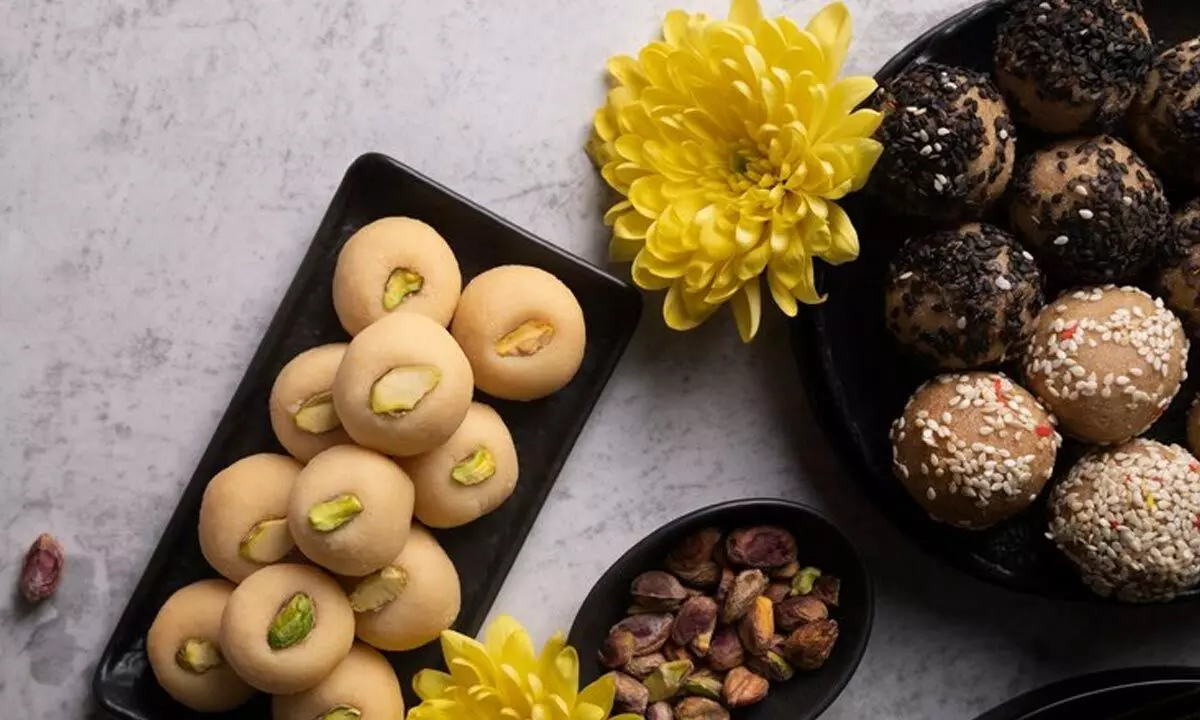Live
- They always want me to win, and now I feel lucky to have been offered a story like ‘Zebra’: Satyadev Kancharana
- ‘Democracy first, humanity first’: PM Modi in Guyana's parliament on two countries' similarities
- PKL Season 11: Telugu Titans register third straight win to top standings
- Is Pollution Contributing to Your COPD?
- NASA Unveils Underwater Robots for Exploring Jupiter's Moons
- Additional Central forces arrive in violence-hit Manipur
- AR Rahman and Saira Banu’s Divorce: Legal Insights into Common Issues in Bollywood Marriages
- 82.7 pc work completed in HPCL Rajasthan Refinery area: official
- Curfew relaxation extended in 5 Manipur districts on Friday
- Tab scam prompts Bengal govt to adopt caution over fund disbursement
Just In
Spice up Sankranti with seeds, superfoods


Makar Sankranti, is a harvest festival celebrated across India with different names
Makar Sankranti is a harvest festival celebrated across India with different names. It’s the time when loved ones come together, feast on delicious food, and celebrate a new beginning, and one of the key elements during this time is the inclusion of seeds in your diet. It could be in the desserts, dishes, or starters.
Seeds, the superfoods are loaded with essential fats, fiber, protein, phenolic compounds, vitamins, and minerals. These are miniature versions of nutritional gems which mimic benefits that are similar to nuts. It is a powder packed with nutrients that one cannot deny adding to their daily diet. Seeds are dense in energy and a source of multiple nutrients in a tiny package with various health benefits. If consumed daily in moderation, Seeds can help prevent certain diseases such as heart diseases, and cancer, have anti-aging properties and restore joint and skin health.
Some of the most popular seeds that are worth including in our daily diet are:
Sesame/Gingelly Seeds (Yellow): Iron, Antioxidant, Fiber, Calcium, Phosphorus, Potassium, and Magnesium
Niger Seeds (Uchellu): Iron, Protein, Calcium, Fatty Acids, Linoleic Acid, Zinc, Magnesium, and Potassium
Poppy Seeds (Khus Khus): Manganese, Copper, Calcium, and Iron
Pumpkin Seeds: Rich sources of Magnesium, Phosphorous, and Manganese
Flaxseeds/Linseed: Omega-3, Thiamine, Fiber, Phytoestrogen, and Magnesium
Sunflower Seeds: Vitamin E, Magnesium, and Manganese
Some of the health benefits of seeds are:
Fats for heart health: Seeds are rich in healthy fats such as Mono Unsaturated Fatty Acids (MUFA) and Poly Unsaturated Fatty Acids (PUFA), bioactive components that aid in reducing bad cholesterol (LDL-C) and improve your good cholesterol (HDL-C) levels.
Fats that fight cancer: There is some evidence to prove that healthy fat and bioactive compounds from seeds such as sunflower seeds help in the fight against cancer cells & delay tumour growth, especially in colon, ovarian & breast cancer.
For overweight, obesity & diabetes: Since seeds are low in carbohydrates and provide healthy fats and essential protein (amino acid), this combination is apt to give you a feeling of fullness which helps to control your hunger & manage your weight. Seeds also bring down your blood triglyceride, and sugar levels and improve insulin sensitivity due to their high fiber and low carbohydrate content in them.
Restores your joints, bone & skin health: There is some research evidence to prove the effect of sesame seeds in reducing pain for Osteoarthritis patients. Sesame seeds also contain a high amount of calcium that is necessary for bone health. Vitamin E and Omega 3 content of seeds are beneficial in skin health & anti-ageing properties. Hemp seeds contain about a 3:1 ratio of omega 6 to 3 which is an optimum range that helps to relieve dry skin, especially for those suffering from eczema & dry skin.
Prevents nutritional deficiencies: If taken in recommended amounts, seeds can prevent nutritional deficiencies as they are rich in minerals, vitamins, and healthy fats. Sesame seeds are known as the ‘Queen of seeds’ and are also used to treat malnutrition.
It is advisable to start by including half a tablespoon of seeds in your daily routine before increasing the quantity of intake. Additionally, one must consult a Registered Dietitian before including seeds in their diet to know if it is suitable for their health.
(The writer is a Head of services – Clinic Nutrition and Dietetics, Aster CMI Hospital, Bangalore)

© 2024 Hyderabad Media House Limited/The Hans India. All rights reserved. Powered by hocalwire.com






